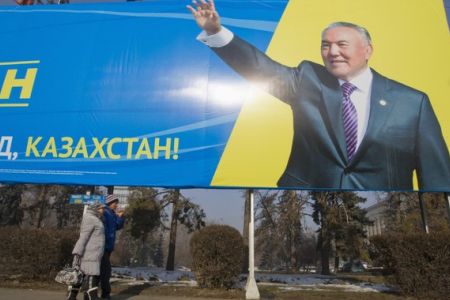
Kazakhstan Embarks on Guided Transition to a Multi-Party System
Publication: Eurasia Daily Monitor Volume: 9 Issue: 14
By:

The elections just held in Kazakhstan have successfully accomplished the limited goal of moving from a single-party to a multi-party parliament. This political opening has come about by decision of the state leadership. This decision marks one step in an evolutionary process of broadening political representation, correlated with the diversification of Kazakhstani society itself.
This process is still at an early stage, however. Thus far, Kazakhstan has been well served by the model of presidential government, with the state presidency holding strong executive powers. This model looks set to continue for some time as a guarantee of reforms within stability. All parties competing in these elections recognized that Kazakhstan’s economic performance rests on long-term political stability, which makes possible an evolutionary process of political reforms.
The head of the OSCE’s Office of Democratic Institutions and Human Rights (ODIHR) election observation mission in Kazakhstan, Miklos Haraszti, derisively complained that the elections were “orchestrated.” Unwittingly perhaps, this reproach is on to something. These elections marked a cautious political opening, initiated by the only authority capable of doing so in Kazakhstan: the state leadership. It is a controlled transition to a multiparty parliamentary system. It marks the start of the process of broadening voter choice and political pluralism.
Political reforms are planned to continue amid debates over the scope and pace of this process. The newly elected Majilis will need to work out a legal mechanism involving labor, business, and local government, for settling labor disputes. A tripartite social partnership along these lines, on a clear legal basis, will be new to Kazakhstan. The violent conflict in Zhanaozen, arising from a labor dispute mishandled by all sides (see EDM, January 17), has convinced the authorities and the political parties to address this issue in the newly elected parliament. Working out a constitutional mechanism to regulate the eventual presidential succession is also a matter to be referred to this Majilis, at the initiative of the executive branch.
The elections just held have generated proposals to broaden the electoral process in the follow-up election cycles. Holding more televised debates among candidates (rather than a single debate among the competing parties’ leaders, as was the case in this campaign) is an uncontroversial recommendation.
Twin proposals to lower the threshold for representation in parliament, from 7 to 5 percent, and allow the formation of electoral blocs, will be considered in Astana with due caution. In immature post-Soviet societies, lowering the parliamentary threshold and allowing the formation of multi-party blocs can result in a proliferation of personal-project parties, protection “roof” parties and narrow interest-group parties, all operating to the detriment of genuine political parties and halting democratic development, instead of advancing it. Meanwhile, Turkey’s parliamentary threshold is 10 percent and the country is seen as a democratic model for Muslim-majority countries.
A further recommendation would abolish the prerogative of the Assembly of the People of Kazakhstan – a consultative body of ethnic groups’ representatives – to designate a contingent of Majilis members. Under the existing electoral system, the Assembly of the People of Kazakhstan designates nine, out of 107 members of the Majilis. This procedure ensures that small ethnic minorities’ representatives accede to seats in parliament. If this avenue is abolished, then another procedure would have to be devised to ensure parliamentary representation of small minorities. A number of post-communist countries in Central-Eastern Europe guarantee parliamentary seats ex-officio for representatives of small ethnic minorities. This guarantee is clearly necessary also in Kazakhstan’s circumstances.
Whether a laissez-faire approach can be applied to the registration of parties is another matter to be considered with due caution. In Kazakhstan, the Alga [Forward] group is being denied legal registration as a party. Linked to the fugitive banker Mukhtar Ablyazov, the Alga group agitates for regime change in Kazakhstan outside the lawful political process, and has recently made an alliance (“Popular Front”) with the old-line Communist Party of Kazakhstan. When that was announced, the authorities suspended the Communist Party’s activities for six months, which made it impossible for the old-line Communists to run in these elections (a younger, moderate communist-denominated party ran and entered the Majlis – see accompanying article). The party Rukhaniyat [Spirituality], an ethnic Kazakh nationalist party that was running in these elections, was de-registered at the last moment due to legal technicalities. While those technicalities had a clear legal basis (Kazinform, December 26-30, 2011), it is also a fact that Rukhaniyat’s platform risked triggering a backlash among elements of the Russian population in Kazakhstan.
Unquestionably, the Majilis has been legitimately elected as the expression of a majority of Kazakhstani voters’ choice. Kazakhstan’s Central Electoral Commission has announced that it would “definitely respond to OSCE/ODIHR’s report and bring our comments to the attention of international organizations” (Kazinform, January 17). However imperfect, the elections just held have advanced the evolutionary process of developing a multi-party parliament and political pluralism in Kazakhstan. It is up to the newly elected Majilis and the parties represented therein to continue advancing this process in tandem with the executive branch.




